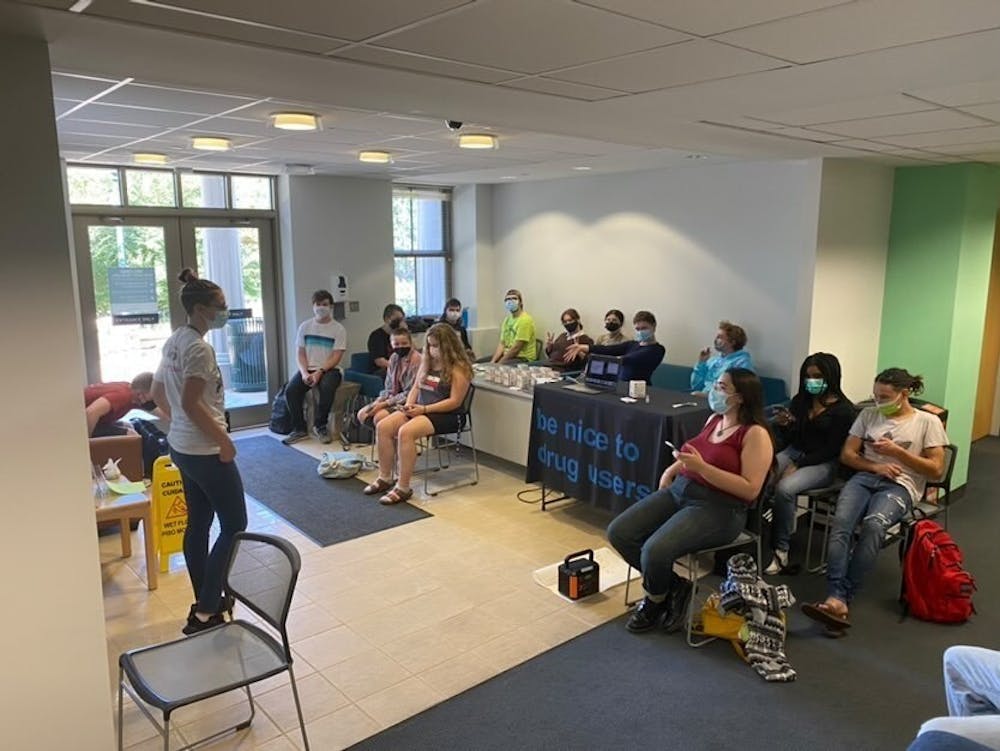Editor’s Note: Kayla Kelly is an opinion columnist for The Eagle. Kelly was not involved in the reporting, writing or editing of this story.
Mutual aid organization Heal Da Homies partnered with HIPS (Honoring Individual Power & Strength) to hold a Narcan training on Sept. 23 to discuss opioid overdose and naloxone distribution.
Abigail Goldner Morris, a senior in the College of Arts and Sciences, is a certified Narcan trainer through HIPS, an organization that promotes the health and rights of people involved in sex work and/or drug use. She has worked with HIPS since 2019, educating students and community members about harm reduction in terms of opioid use.
“I know that a lot of AU students, staff members [and] faculty don’t even know what Narcan is, or what fentanyl is,” Morris said. “There’s so much misinformation, so any opportunity I have to help folks learn about the overdose epidemic and how preventable overdose can be with the right harm reduction tools is one I’ll take.”

Morris’ presentation covered the symptoms and risk factors of an opioid overdose, overdose prevention strategies, side effects of naloxone — a safe, effective antidote to opioid overdoses — and how to administer Narcan and how to respond to an opioid overdose.
“This is [an] epidemic that — with the right policies and harm reduction tools — is something we can stop,” Morris said. “We, as individuals, can make a huge difference by carrying Narcan, by being informed, knowing what drugs we’re using, knowing how to test our drugs, knowing other harm reduction tools and knowing how to use Narcan.”
Morris, along with HIPS, takes a harm reduction approach to drug use, as opposed to abstinence. Harm reduction strategies can include overdose education, safer drug use kits and fentanyl test strips.
“I would love to see [Narcan] being handed out in the same way condoms are handed out at HPAC or around campus,” Morris said.
Morris said that people, especially college students, will engage in drug use regardless, so it is better to reduce overdose deaths than further stigmatize drug users.
Kayla Kelly, a sophomore CLEG major and CEO of Heal Da Homies, said they hope that American University students will use their privileges to uplift marginalized communities rather than being bystanders.
“With AU students being members of the D.C. community, it’s our duty to protect our community members,” Kelly said.
According to NPR, opioid overdose deaths among middle-aged Black men increased 245 percent from 2014 to 2017 in D.C. A study conducted by the National Institute on Drug Abuse at the National Institutes of Health shows that deaths among Black Americans are growing faster than among white Americans.
“I hope that [attendees] paid special attention to the statistics of how the opioid epidemic plagues the Black community, especially older Black men,” Kelly said. “If they say they’re for Black lives, I hope they take the initiative to actually protect Black lives and not just take this training as something to put on their resume.”
Kelly said that their plan for Heal Da Homies involves future teach-in sessions like this one, in hopes of getting more students to aid surrounding communities for more than mere personal gain.
Sophomore Caleb Burr, who has been a member of Heal Da Homies for the past eight months, attended Thursday’s training to learn what to do if he encountered someone who has overdosed.
“I’m fortunate enough to come from an area that wasn’t really affected by the opioid epidemic all that much,” Burr said. “I didn’t know anything about how to treat someone who’s overdosing or what to do. There are a lot of people who are suffering from opioid addiction and I may possibly come into a situation with someone who’s overdosing.”
Through the training, Burr said he learned valuable information about the opioid epidemic, namely knowing when and how to safely administer Narcan — never in a situation where the person is simply asleep or high.
“If we’re properly trained and informed about Narcan, we can save [a] person’s life, and that’s really important,” Burr said.
Burr and Morris both agreed on the importance of Narcan to save lives.
“If someone overdoses and dies, they can never recover. But if someone overdoses and someone has Narcan, that person lives,” Morris said. “It’s really that simple.”





